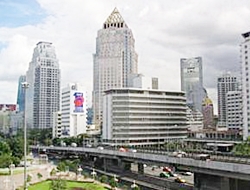BANGKOK, July 28 – Thailand’s Fiscal Policy Office (FPO) on Thursday projected the country’s economy in the second half of this year will grow by five per cent, driven by rising domestic consumption, investment and exports.
FPO Director Naris Chaiyasoot said the Thai economy in the second quarter, and in June, continued to expand, raising the Gross Domestic product (GDP) by 3.6 per cent, year-on-year.

A major factor contributing to the growing GDP was a sharp increase of tourist arrivals of 4.4 million, a 50.1 per cent increase compared to the corresponding period last year in which the arrivals were quite low due to political disturbances between March and May, Mr Naris said.
The FPO chief said that commercial banks saw their credits soaring by 14 per cent, while the agricultural sector, expanded at a slower pace by 6 per cent, compared with the first quarter.
The GDP in the second half of the year is likely to rise by five per cent, driven by domestic consumption stimulated by the government’s policy, domestic investment and exports, Mr Naris said. The projected GDP will be as earlier targeted at a range of 4-5 per cent.
The June economy accelerated, especially exports, rising by 16.8 per cent year-on-year to US$21 billion, Mr Naris said. However, the Thai economy is not overheated as its capacity utilisation remains under 60 per cent and it can be further utilised without causing inflationary pressure.
Regarding the Bt300 daily wage planned rise by the Pheu Thai Party, Mr Naris said the FPO estimated that the wage will be raised by 40 per cent if the new government adjusts the current daily minimum wage at Bt215 to Bt300 as promised. Some 5.4 million workers, accounting for 8.5 per cent of the country’s population, are entitled to the new wage.
With the wage hike policy, consumption will likely grow by two per cent, Mr Naris explained. He said it will not greatly accelerate inflation and investment, as the FPO believes the new government will offer relief measures for the private sector such as a corporate tax cut from 30 per cent to 23 per cent to help offset rising production costs.
Meanwhile, the Bank of Thailand (BoT) on Thursday reported that unemployment fell to its lowest level in June at 0.5 per cent, down from 0.6 per cent in April and 0.7 per cent in March.
Songtum Pinto, senior director of BoT Office of Macroeconomics, said a shortage of labour is reported, particularly in the electronics industry, thanks to the growing economy.




